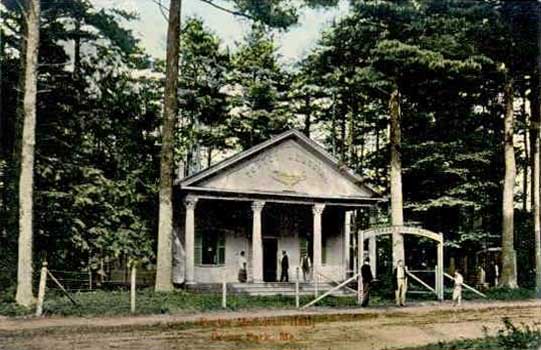The Chautauqua Tradition
Ocean Park – Chautauqua- by- the- Sea
Summer 2025 – 145th Season

Founded in 1881, the unique seaside community of Ocean Park, Maine still flourishes as a summer assembly—in the Chautauqua tradition—with over 140 years of history and heritage.
Ocean Park welcomes families to come and take part in an experience dedicated to inspiring and engaging all generations. Ocean Park is an opportunity to vacation and learn, to worship and play, to enjoy and celebrate. It is a retreat to the quiet of the pines and the beach where the spirit is renewed and life is affirmed. The Ocean Park Association offers an abundance of spiritual opportunities, educational talks, recreational activities and cultural arts performances.
The Chautauqua Tradition
How it All Began

The word “chautauqua” is Iroquois and means either “two moccasins tied together” or “jumping fish.” Whatever the precise meaning, it’s clear the word described a lake in western New York which by the Civil War was known as Chautauqua Lake. In 1874, John Heyl Vincent and Lewis Miller rented the site of a Methodist camp meeting to use in the post-camp meeting season as a summer school for Sunday school teachers; this became known as the Chautauqua Institution. This reflected a nation-wide interest in the professionalization of teaching. They were very clear that their intent was educational, rather than revivalist. It should be stressed that the Chautauqua Institution was never affiliated with any one denomination; pretty much every faith group in the U.S. has a chapel or building on the grounds today. Still, the sort of mild Protestantism that has informed much of American culture was an underpinning of the Chautauqua Movement.
The Early Years
Within a few years, the scope of the Chautauqua Institution had broadened to include adult education of all kinds, as well as a correspondence course—the Chautauqua Literary and Scientific Circle, designed to bring “a college outlook” to working and middle-class people. Along with the educational (and education was broadly defined to include the arts and public affairs) offerings at Chautauqua, its thousands of summer residents attended concerts and social activities. By the last decade of the nineteenth century, the Chautauqua Institution was nationally known as a center for rather earnest, but high-minded, activities that aimed at intellectual and moral self-improvement and civic involvement.
The Chautauqua Movement is alive and well today.
(source: https://www.chautauquatrail.com/the-chautauqua-movement)
We invite you to explore the Chautauqua Trail,, visit https://www.chautauquatrail.com/
Download the complete pdf of The Story of Chautauqua by Jesse Lyman Hurlburt, published in 1921.
Chautauqua Trail
We are part of the Chautauqua Movement! Two different people came together and created a nation-changing movement, Chautauqua. There are many Chautauquas across North America. Chautauqua meets you where you are on your life journey and nudges you to slow the pace of life with religion, education, arts, and recreation. The movement is alive and thriving. Learn more about all the Chautauquas!

